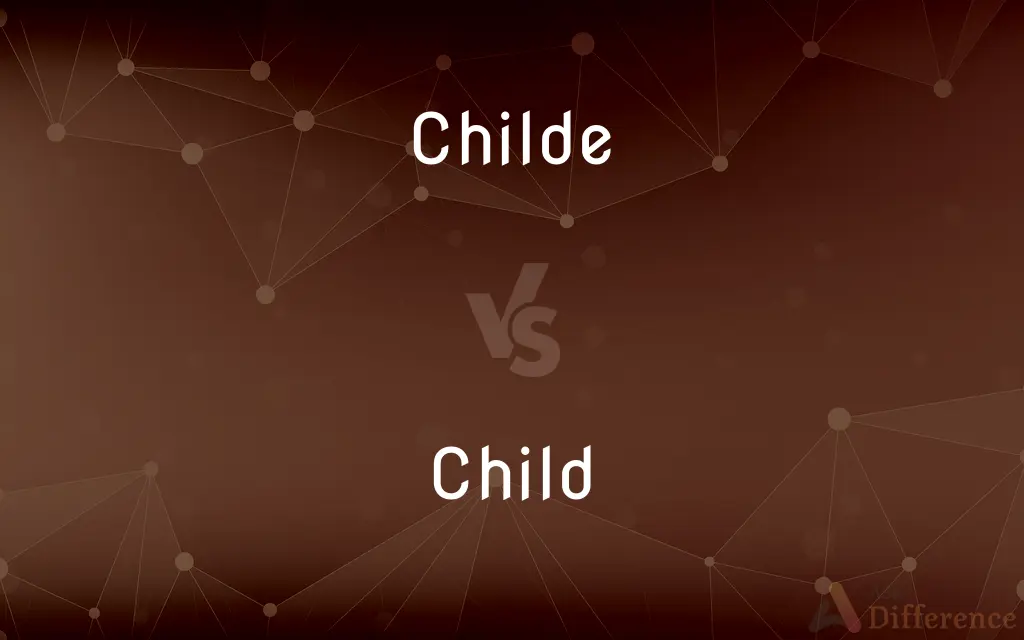Childe vs. Child — What's the Difference?
By Tayyaba Rehman — Updated on January 7, 2024
"Childe" refers to a young nobleman, often in historical or poetic contexts, while "Child" denotes a young human being, typically under the age of teen.

Difference Between Childe and Child
Table of Contents
ADVERTISEMENT
Key Differences
"Childe" is a term historically used to describe a young nobleman, often appearing in literature and poetry. It conveys a sense of aristocracy and youth. In contrast, "Child" is a universally understood term that refers to a young person, typically under the age of teen. This word is neutral in terms of social class or status.
The usage of "Childe" is less common in modern English and is usually found in historical or poetic contexts. It evokes a bygone era and is often associated with medieval or romantic settings. On the other hand, "Child" is a common word used in everyday language, spanning across all cultures and time periods.
In terms of linguistic roots, "Childe" derives from Old English and was used in Middle English literature, like in the phrase "Childe Harold" by Lord Byron, signifying a young noble. "Child," however, comes from the Old English 'cild' and has retained its meaning over centuries, referring to a young human.
"Childe" often carries with it a romanticized or idealized notion, especially in poetry or historical narratives. In contrast, "Child" is a straightforward term, used to refer to the early stages of human life, with no inherent romantic or aristocratic connotations.
In summary, while "Childe" and "Child" both relate to youth, their usage, connotations, and historical contexts differ significantly. "Childe" is specific to certain literary and historical contexts, while "Child" is a broad, everyday term.
ADVERTISEMENT
Comparison Chart
Usage Frequency
Rare, mostly in historical and poetic contexts
Common, used in everyday language
Social Connotation
Associated with nobility or aristocracy
Neutral, no specific class connotation
Historical Context
Found in medieval or romantic settings
Universal, throughout human history
Linguistic Origin
Old English, used in Middle English literature
Old English, retained original meaning
Connotations
Romanticized, idealized
Straightforward, literal meaning
Compare with Definitions
Childe
A term used in medieval literature for a young knight.
The brave Childe ventured forth on his quest.
Child
A young human being below the age of teen.
The child played happily in the park.
Childe
Historically, a son of a noble family.
The Childe was trained in the arts of war and peace.
Child
An expression used for someone who is immature.
Stop acting like a child!
Childe
A title for a young nobleman.
Childe Roland to the Dark Tower came.
Child
A son or daughter of any age.
She is the eldest child in her family.
Childe
An archaic term for a young gentleman.
The Childe was well-versed in classical languages.
Child
Used to refer to someone's younger years.
He moved to the city as a child.
Childe
A poetic reference to a young man of noble birth.
In the court, every Childe had his own coat of arms.
Child
In legal terms, a person under a certain age.
The law provides special protection for a child.
Childe
A youth of noble birth.
Child
A person who has not attained maturity or the age of legal majority.
Childe
In the Middle Ages, a childe or child (from Old English: Cild "Young Lord") was a nobleman's son who had not yet attained knighthood or had not yet won his spurs. As a rank in chivalry it was used as a title, e.g.
Child
An unborn infant; a fetus.
Childe
A child of noble birth.
Child
An infant; a baby.
Childe
The cognomen given to the oldest son prior to his taking his father's title.
Child
One who is childish or immature.
Childe
A cognomen formerly prefixed to his name by the oldest son, until he succeeded to his ancestral titles, or was knighted; as, Childe Roland.
Child
Someone to whom a specified person is a parent.
Child
A member of a tribe; descendant
Children of Abraham.
Child
An individual regarded as strongly affected by another or by a specified time, place, or circumstance
A child of nature.
A child of the Sixties.
Child
A product or result of something specified
“Times Square is a child of the 20th century” (Richard F. Shepard).
Child
A kid aged 1 to 11 years, whereas neonates are aged 0 to 1 month, infants are aged 1 month to 12 months, and adolescents are aged 12 years to 18 years.
Regular chores can be appropriate for both children and adolescents, given age-appropriate limits on difficulty level and time on task.
Child
(cartomancy) The thirteenth Lenormand card.
Child
(figurative) A figurative offspring, particularly:
Child
A person considered a product of a place or culture, a member of a tribe or culture, regardless of age.
The children of Israel.
He is a child of his times.
Child
Anything derived from or caused by something.
Child
(computing) A data item, process, or object which has a subservient or derivative role relative to another.
The child node then stores the actual data of the parent node.
Child
Youth of noble birth
Child
(mathematics) A subordinate node of a tree.
Child
A female child, a girl.
Child
To give birth; to beget or procreate.
Child
A son or a daughter; a male or female descendant, in the first degree; the immediate progeny of human parents; - in law, legitimate offspring. Used also of animals and plants.
Child
A descendant, however remote; - used esp. in the plural; as, the children of Israel; the children of Edom.
Child
One who, by character of practice, shows signs of relationship to, or of the influence of, another; one closely connected with a place, occupation, character, etc.; as, a child of God; a child of the devil; a child of disobedience; a child of toil; a child of the people.
Child
A female infant.
A boy or a child, I wonder?
Child
To give birth; to produce young.
This queen Genissa childing died.
It chanced within two days they childed both.
Child
A human offspring (son or daughter) of any age;
They had three children
They were able to send their kids to college
Child
An immature childish person;
He remained a child in practical matters as long as he lived
Stop being a baby!
Child
A member of a clan or tribe;
The children of Israel
Common Curiosities
Is Childe commonly used today?
No, Childe is rare and mostly found in historical or poetic contexts.
Can Childe refer to a girl?
Historically, Childe was used for young males, particularly of noble birth.
Is Child gender-specific?
No, Child is a gender-neutral term.
What does Child typically refer to?
Child refers to a young human being, usually under the age of teen.
Does Childe imply nobility?
Yes, Childe often conveys a sense of aristocracy or nobility.
Can Child be used in a legal context?
Yes, Child is often used legally to define someone under a certain age.
What type of literature features Childe?
Childe is often found in medieval, romantic, or poetic literature.
What is the origin of Childe?
Childe originates from Old English, used in Middle English literature.
Are Childe and Child interchangeable?
No, due to their different connotations and historical uses, they are not interchangeable.
Do both terms have the same linguistic roots?
Both have Old English origins but have evolved differently.
Can Child have negative connotations?
Sometimes, Child can be used to imply immaturity.
Does Childe appear in modern literature?
Childe appears primarily in historical or classical literature.
Is Childe used in everyday conversation?
No, Childe is not typically used in everyday speech.
Is the term Child culturally specific?
No, Child is a universal term across cultures.
Share Your Discovery

Previous Comparison
Lollipop vs. Popsicle
Next Comparison
Lame vs. LimpAuthor Spotlight
Written by
Tayyaba RehmanTayyaba Rehman is a distinguished writer, currently serving as a primary contributor to askdifference.com. As a researcher in semantics and etymology, Tayyaba's passion for the complexity of languages and their distinctions has found a perfect home on the platform. Tayyaba delves into the intricacies of language, distinguishing between commonly confused words and phrases, thereby providing clarity for readers worldwide.














































